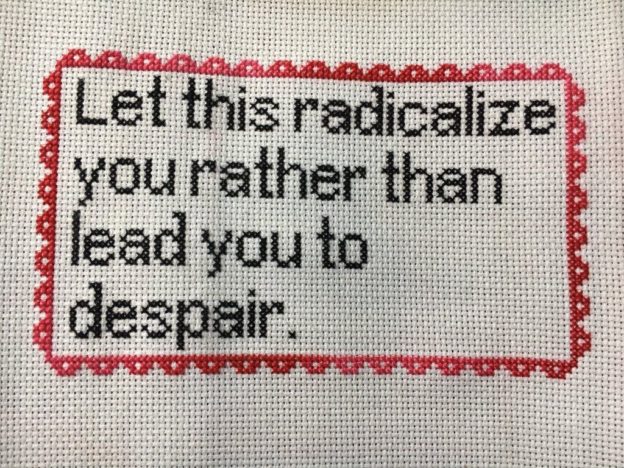Antidote to Despair

I don’t need to enumerate the newspaper headlines that make the world feel like a dark and calamitous place right now. Everyone I know is struggling to keep from sinking under the weight of so much cruelty and venality. One case in point is the leaked draft decision indicating that the Supreme Court is on the verge of overturning Roe v Wade, which would undo 50 years of legal precedent and allow the banning of abortion by any state government with the will to do it. Alito’s draft decision states that “the Constitution makes no reference to abortion, and no such right is implicitly protected by any constitutional provision,” so if the all white, all male drafters of the constitution hadn’t intended it at the time, we are afforded no protections by the document. If that isn’t scary enough, some legal analysts say that Alito’s draft opinion, by referring to fetuses as human beings, grants them rights that could give momentum to efforts to enact a federal ban on abortion. And to be clear, that is the stated goal of the forces behind this decision.
An interesting piece in The Lever shines a light on anti-abortion zealot Leo Leonard who has been working for many years to undermine Roe. His Judicial Crisis Network and its anonymous donors have toiled long and hard to build an ultra-conservative majority in the Supreme Court that could now rule for decades. The piece goes on to detail the dithering of the Democrats that allowed this to happen, but then offers strategies for what that party might yet do to protect reproductive freedom. One promising tactic is federal protection for and expanding the reach of medication abortion.
In this week’s Special Edition of the At Liberty Podcast Brigitte Amiri, the Deputy Director of the ACLU’s Reproductive Freedom Project, recommended that each of us connect with our local reproductive health, right, and justice organizations, as well as practical community support groups and abortion funds. She further suggested that now is the time to contact our elected officials to let them know where we stand on this issue. While I will certainly support electoral organizing to put progressive and leftist candidates into office, much of my attention will be focused on radical grassroots groups such as New York City for Abortion and mutual aid efforts such as the New York Abortion Access Fund and the Mississippi Reproductive Freedom Fund. On The Cut, Bridget Read and Claire Lampen put together a helpful annotated list of abortion funds in states with the most restrictive abortion laws.
Yesterday I read a beautiful and scary piece by Grace Paley about what life was like before Roe. Paley wrote, “I think women died all the time when abortions were illegal. The horrible abortions were one way; the other was the refusal of institutions—medical, church, and state—to care for you, their willingness to let you die.” The upcoming Supreme Court ruling will not outlaw abortions altogether throughout the entire country at this time. Access to this essential medical care will be determined by where you live and how much money you have, which is already the case in many places, and on our battle to maintain and even expand this access. As Melissa Gira Grant points out in this excellent piece The Real Fight for Abortion Rights Is Not in the Courts or Congress, even before the court strikes down Roe 89% of U.S. counties do not currently have a clinic that provides abortions.
Melissa Gira Grant concludes her piece with this paragraph:
As true as it might be to say, “If they come for Roe tonight, they’re coming for marriage equality tomorrow,” there are plenty of people they have come for already, from trans kids seeking health care to people giving birth in jails to sex workers sharing harm-reduction information to criminalized survivors of intimate partner violence. If you are today feeling for this first time like the government is demanding control over your gender and sexuality and bodily autonomy, you are, sadly, in numerous company. But that also means that there are countless people around you who already know that freedom, certainly now and maybe always, will not come solely from what the law can recognize. Either the law must be pushed to recognize those rights, or those rights must be won despite the law.
Abortion rights were won in this country because tens of thousands of people took to the streets and millions of others were organized to support the cause. We must continue the fight because as Angela Davis put it, “Freedom is a constant struggle.” But our organizing can’t be narrowly focused on abortion—it must include all those vulnerable to concerted right-wing assaults on autonomy and dignity. As Reverend Jacqui Lewis put it, “Liberation is collective. We only get free when we fight for all of us.”
I recently listened to a podcast interview with geographer and prison abolitionist Ruth Wilson Gilmore in which she said, “And while I think a feeling of despair in this day and age is not difficult to understand, I also feel that, as my grandparents taught me, that despair was a luxury that I didn’t get to sport.” Let’s shrug off the coat of mourning and get to work.
Nancy Kricorian
New York City
May 5, 2022